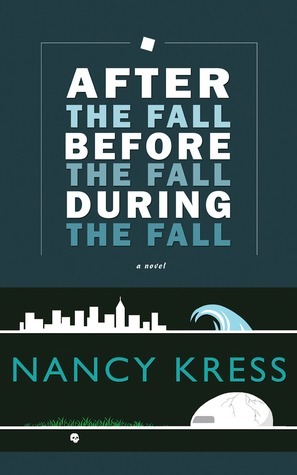What do you think?
Rate this book


193 pages, Kindle Edition
First published April 1, 2012
Nancy Kress' novella packs a big punch into a small package by combining powerful ideas with a clever story-telling structure and telling the story through the eyes of people you don't typically find at the heart of a so-this-is-the-end-of-the-world? story.
The makes-my-brain-stutter title, 'After The Fall, Before The Fall, During The Fall' isn't just decorative. It reflects the three converging timelines the story is told on.
We start 'After The Fall' in 2035, with twenty-seven human survivors, split between the ageing adults and the often weak or disabled young, living in a dome they didn't build and can't leave, on a devastated barren Earth and hoping to be the future of humanity.
We go back to 'Before The Fall' and watch a quant mine the data that tells her the world is heading for disaster and knowing that not only will no-one listen but that sharing the data will make her a target.
We converge on 'During The Fall' through an elaborate hard-for-the-reader-to-predict-but-fun-to-watch path. Then, right at the end, when we think we know just how bad everything is and how blind we were and how screwed we are, we get something new.
Nancy Kress makes this multiple timeline technique work well, using it to increase the tension and the sense of doom while leaving just enough wriggle room for hope that you don't give up.
The book was published in 2012. Reading it in 2020, it seems even more grimly plausible than it must have done then. I think it's a great example of Cli Fi (Climate Fiction).